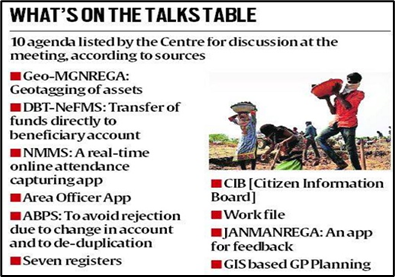Why in news?
- Recently, the Centre held a Samvaad (dialogue) with civil society organisations on the good governance initiatives taken under the rural job guarantee scheme - Mahatma Gandhi National Rural Employment Guarantee Scheme (MGNREGS).
- This was first such initiative taken by the Centre.
- This dialogue was organised after criticism over mandatory use of the National Mobile Monitoring System (NMMS) app.
- The app captures attendance of those claiming work under MGNREGS.
What’s in today’s article?
- Mahatma Gandhi National Rural Employment Guarantee Scheme (MGNREGS)
- News Summary
Mahatma Gandhi National Rural Employment Guarantee Scheme (MGNREGS)
- The National Rural Employment Guarantee Act (NREGA) was notified in September, 2005.
- In 2009, an amendment was made in the Act to change the name to Mahatma Gandhi National Rural Employment Guarantee Act (MGNREGA).
- Mandate: To provide at least 100 days of guaranteed wage employment in a financial year to every rural household whose adult members volunteer to do unskilled manual work.
- The Mahatma Gandhi National Rural Employment Guarantee Scheme (Mahatma Gandhi NREGS) was created as directed in Mahatma Gandhi NREGA and the means to implement the Act so that the guarantee comes into effect.
- MGNREGS is a Centrally-Sponsored Scheme i.e., the scheme is jointly funded by the Central government and the State governments.
- Concerned Ministry: Ministry of Rural Development
Salient Features of the Scheme:
- Legal Right to Work –
- The MGNREGA provides a legal guarantee for wage employment.
- Every rural household has the right to register under MGNREGA.
- Also, at least one-third of the beneficiaries of the scheme have to be women.
- There are legal provisions for allowances and compensation both in cases of failure to provide work on demand and delays in payment of wages for work undertaken.
- Demand-Driven –
- It is a demand-driven programme where provision of work is triggered by the demand for work by wage-seekers.
- Decentralized mode of implementation –
- The State governments have powers to make rules and amend the concerned State scheme.
- Gram Panchayats (GPs) are to implement at least 50 per cent of the works in terms of cost.
- Plans and decisions regarding the nature and choice of works to be undertaken, the order in which each work is to be triggered, site selection etc. are all to be made in open assemblies of the Gram Sabha and ratified by the GP.
- Annual Report tabled in the Parliament –
- An Annual Report prepared by the Central Employment Guarantee Council (CEGC), on the outcomes of MGNREGA is required to be presented annually by the Central Government to Parliament.
- CEGS is a statutory body set up under Section 10 of the MGNREGA.
- It is chaired by the Union Minister for Rural Development.
- The MGNERGA covers the entire country with the exception of districts that have a hundred percent urban population.
Performance of the Scheme in last 3 years:
- As per the data available on the scheme portal, 7.55 crore families availed the scheme during 2020-21. However, the number came down marginally to 7.26 families during 2021-22.
- Economic Survey 2022-23 on MGNREG Scheme
- The Economic Survey 2022-23, said there has been a Year-on-Year (YoY) decline in monthly demand for MGNREGS.
- The reason behind this is that the rural economy is normalising due to strong agricultural growth and a swift bounce-back from Covid-19 pandemic.
- In FY23, as on 24 January 2023, 6.49 crore households demanded employment under MGNREGS, and 6.48 crore households were offered employment out of which 5.7 crore availed employment.
News Summary: Facing flak over NREGS rule changes, govt holds talks on its initiatives
- Recently, Centre held dialogue with civil society organisations on the good governance initiatives taken under the MGNREGS.

Background:
- Changes were introduced recently in the NREGS attendance and payment system.
- Following these change, NREGS workers, under the banner of ‘NREGA Sangharsh Morcha’, are demanding rollback of the two decisions:
- making the NMMS app mandatory from January 1, and
- the requirement of wages to be made through Aadhaar-Based Payment System (ABPS).
- While the government says the changes were brought in to check corruption and for transparency, critics call it unfeasible.
- Poor network and connectivity in hinterlands, digital illiteracy, besides lack of awareness and even access to smartphones and internet for many, make it difficult for the rural workers getting jobs under NREGS.










